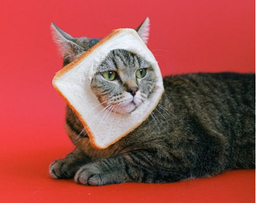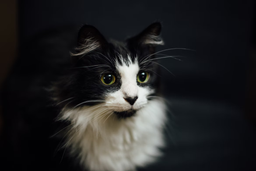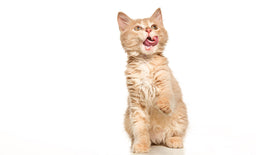Is vegan cat food suitable for felines? Untamed addresses the meaty debate
With the emerging wave of veganism hitting the world, many people are looking into plant-based diets for their pets. While omnivore pets, like dogs, might do fine with balanced vegan diets, hardcore carnivores like cats struggle with veganism. Is vegan cat food completely inappropriate for felines, or is there a chance their meat-friendly system can adapt to it?
The biggest concern with a vegan cat diet is not palatability or preference but whether it can deliver the crucial nutrients. Unfortunately, you won’t find many well-documented studies on the impact of veganism on felines. With that in mind, we’ll evaluate the meat-free diet for cats to determine how it affects their health and well-being in the long run.
We must clarify that we are not looking to make an ethical or moral statement here but to examine the available data and determine:
- Whether vegetarianism or veganism is beneficial to our whiskery friends
- What food best complements their predatory constitution

“Can a cat be a vegetarian?” they wonder. I wish I could speak for myself.
Source: Jorge Zapata
Can cats be vegetarians?
Cats are hardwired carnivores. It’s not solely about the instinctive setup of their brains but the basic structure of their digestive system. Compared to herbivores and omnivores, cats have shorter small intestines, which works for them as they eat in smaller portions, albeit more frequently.
The enzymes secreted by the feline digestive glands support easy digestion and metabolism of fresh prey, but not plants. For example, cats cannot digest the cellulose content of leafy greens. Getting them to eat a veggie salad every day means forcing their digestive system to process inadequate food, leading to potential gastrointestinal issues.
The nutritional map—can a cat survive on a vegetarian diet?
If vegetarian cats are a myth, why is vegan cat food being manufactured and sold across the country? According to a study on attitudes and feeding practices of pet owners, vegans or vegetarians are more likely to try similar diets with their pets. But should humans impose personal preferences on cats?
To find answers, we’ll evaluate the daily nutritional requirements in felines and review how plant-based diets contribute to them.
The core nutritional needs of a cat—what do vets say?
Cats are not miniature versions of dogs. They require specific vet-recommended micronutrients for growth and maintenance that their system can effortlessly absorb. You can check them out in the following table:
|
Nutrient |
Details |
|
Proteins |
Like their cousins in the wild, domesticated cats also need a diet high in proteins, containing the following essential amino acids:
Of the above, cats cannot synthesise taurine and arginine themselves. Since taurine is only found in whole meats and organs, plant-based proteins are nutritionally inadequate for cats |
|
Carbohydrates |
Carbs are not essential for cats, who tend to burn proteins and fats for energy. That’s why they don’t have the oral enzymes needed to break down carbs in the mouth. While their digestive glands can eventually process carbs, vets recommend keeping their carb intake below 3% in their diet |
|
Fats |
Cats need a small amount of fat in their diet for metabolism and energy processing |
|
Vitamins and minerals |
Vitamins and minerals are crucial in a cat’s diet as they:
Cats can get the necessary vitamins and minerals from meat |
|
Water and fibre |
A cat’s natural diet in the wild provides the right amount of moisture (blood) and fibre (tendons, soft bones, and ligaments) to facilitate problem-free digestion. Indoor cats should drink 60 millilitres of water daily for every kilogram of their body weight. The fibre in any pet food should be between 1% and 4 % |
What goes into a vegan diet for cats?
If you analyse the labels of existing vegan cat food on the market, you’ll find brands relying on synthetic additives and fillers to compensate for the lack of meat. Here’s a breakdown of typical replacements in vegan cat products:
- Plant protein—A cat consuming vegan food will get proteins from legumes and vegetables like soya, potatoes, peas, and rice. Some brands also use byproducts like brewer’s yeast to meet the minimum recommended protein values. As for taurine, vegan products contain a chemically synthesised amino acid to fulfil the minimum requirement, but its bioavailability is questionable
- Fats and carbs—Vegan cat food usually contains a lot of carbs and fats. Calorie dense items like grains, starchy vegetables, and certain fruits are substantial ingredients of vegan pet food, so vegan products contain a surplus of carbohydrates
- Vitamins and minerals—A cat on a vegan diet depends on dietary supplements to get vitamins and minerals. Some brands add synthetic additives to the food, but the quality and efficiency of such additives is iffy
- Fibre—Grains are a viable source of fibre in specific amounts, but certain brands may try to replace quality grains with cheap fillers like weeds, straw, corncobs, and peanut hulls that can hurt the feline digestive system
Most vegan brands offer dry cat food in the form of kibble, so you must ensure your furry companion drinks a lot of water if they are dependent on kitty biscuits.
What if I add milk to the mix—does vegetarian cat food sit well with felines?
Although vegetarian products include animal-sourced ingredients, like milk, dairy, or eggs, your feline won't thrive without meat in their meal plan.
Most cats develop gradual lactose intolerance once they are weaned off their mother’s milk. Giving milk and dairy products, like cheese and yoghurt, to cats can cause health problems, such as:
- Gastrointestinal disturbances
- Obesity
- Heart disease
Switching to vegan or vegetarian food for cats? Here’s what can happen
According to expert nutritionists, cats who have been on a vegan or vegetarian diet for some time may face the following issues:
- Malnutrition—Going meat-free means cats have to put up with hard-to-digest plant proteins. To make matters worse, the percentage of crude proteins in vegan food may be scanty, leading to loss of muscle mass, poor immunity, and deteriorating skin health
- Taurine deficiency—Taurine deficiency results from malnutrition but needs to be addressed separately because of the severe consequences. If a cat doesn't get taurine for more than six weeks or is unable to digest the synthetic replacement in vegan food, they could start showing symptoms of:
- Irreversible blindness due to damaged retinal nerves
- Enlarged heart (can be fatal)
- Immune system disorders
- Stomach sensitivity—Since vegan food is unnatural to cats, their digestive system will suffer. This food triggers food allergies due to grains and starchy veggies, frequent bouts of diarrhoea, inconsistent pooing, nausea, and loss of appetite
- Diabetes—Most vegan cat food products come loaded with carbs. A low-protein, high-carb diet causes insulin resistance in cats, especially seniors
- Disruption of pH levels—Cats are vulnerable to renal and urinary diseases triggered by the change in pH levels, which a vegan diet can trigger. Felines have slightly acidic digestive tracts necessary to digest raw meat. A cat on a vegan diet would have a highly alkaline body, potentially leading to urinary tract infections (UTIs). Untreated UTIs cause bladder stones, inflammation, and incontinence
Will a cat accept vegetarian food?
Domesticated cats eat vegetarian food based on grains, milk and dairy products, or eggs. They may also enjoy bite-sized pieces of fruits and cooked vegetables occasionally. If you only serve vegetarian meals to your cat, they will have no option but to accept it when they are famished—but the nutritional value of such meals wouldn’t be optimal.
Many cats still struggle to accept a full-fledged vegetarian or vegan diet because it doesn’t appeal to their senses. A cat chooses their food by smell. Since vegetarian or vegan food doesn’t emanate the same aroma as meat, they may have a hard time warming up to such meals. Many meat-free food brands use taste enhancers and aromatic additives to make their product more palatable to felines, which causes more harm than good.

Patiently waiting for the next evolutionary upgrade that lets me digest these beauties without any tummy problems.
Source: mohamed_hassan
What if I introduce vegan food to a kitten—will they adapt?
Some vegan cat food advocates are convinced that kittens would never crave meat if raised on a plant-based diet. It is an ill-conceived idea as “ignorance” is not bliss for kittens but deprivation. Most vets recommend kitten food high in animal protein to support muscle growth and optimum weight gain. The sudden introduction of vegan food to kittens may harm their fragile digestive system and cause diarrhoea. Excessive loss of fluids can be fatal to kittens. There have been horrifying incidents of kittens almost dying due to a strict vegan diet, so you should avoid such experimental diet plans for younglings.
The bottom line—cats don’t need a vegetarian diet but an ethical one
Caring for a feline comes with numerous responsibilities. If we are sincere about feline welfare, we must respect their instincts and needs by giving them appropriate food. As humans, what we should be concerned about is the ethical aspect of the cat food industry.
Let’s take a quick look at some of the raging ethical issues around cat food (vegan cat food included):
|
Ethical markers |
What’s ideal |
What’s not |
|
Is a product animal-cruelty-free? |
|
|
|
Do ingredients come from sustainable sources? |
|
|
|
What is the carbon output? |
|
|
|
Is a cat food brand being transparent? |
|
|
Choose Untamed to keep your feline healthy—the ethical way
Picking cat food doesn’t have to be complicated. Untamed offers high-quality products made according to the highest ethical standards! When it comes to cat food, we honour the dietary predisposition of felines and use:
- Human-grade whole meats acquired from cruelty-free and hormone-free sources only
- Sustainably caught fish and seafood
We use vet-formulated grain-free recipes only, which makes our products free of agricultural contaminants found in grains. To keep our carbon footprint at a minimum, we have also put a lot of thought into our:
- Food production—Untamed has strayed away from the retail herd of mass-production with little quality control. We offer wet food in gravy and jelly steam-cooked to preserve the nutrients
- Packaging and distribution—We only use recyclable cans for our products, no plastic bags or pouches. The eco-friendly packaging also helps our products have a shelf life of three years
While we take pride in our pledge to safeguard our planet, we're also committed to making the tastiest meals for cats! All Untamed products are nutritionally balanced, aromatic, and lip-smacking delicious, even to the notoriously fussy felines.
Click here to take our TRY NOW quiz and order a personalised trial pack for your cat at the best rate!

Why look for vegan or vegetarian cat food in the UK when Untamed’s ethical cat food is here to start a revolution!
Source: (c) Untamed
The ins and outs of feline nutrition—Untamed covers all the bases
Fulfilling the nutritional needs of your precious furry companion comes effortlessly with Untamed. Our products offer:
- Quality proteins—We use the prime cuts of meat and organs in our products to ensure cats get adequate taurine, antioxidants, vitamins, and minerals from our food. Based on your feline’s preferences, you can pick the following delicacies:
- Chicken breast and liver
- Duck breast
- Shrimp
- Tuna steak
- Salmon fillet
- Sardines
- Mackerel fillet
- Balanced portions—If your cat has a tendency to overeat, Untamed can be the ultimate diet food for them! Our protein-dense portions are filling and nutritious without the fattening carbs and sugars
- Hypoallergenic food—We use allergen-free recipes designed by nutritionists and keep our food free of harsh preservatives and iffy animal derivatives. Our food caters to the constitution of cats with a sensitive stomach. If you have an older cat troubled by persistent tummy upsets, try Untamed and see the difference for yourself!
Our satisfied clients have reported the following positive changes after switching to Untamed:
|
Timeline |
Untamed effect |
|
Within one week |
|
|
In two months |
|
|
After four months |
|
|
For life |
|
Here’s how to get Untamed!
Pet food shortage in UK supermarkets is becoming a common (and rather unsettling) inconvenience. After observing the struggles of many cat parents dependent on pet food stores, we have established a direct-to-doorstep online cat food delivery system for our clients.
Follow the steps listed below to place your first order:
- Visit our TRY NOW page
- Tell us more about your cat
- Select a meal plan and place your order
You will receive your first trial taster pack within a day. If you want to go fully Untamed, we will deliver the supplies every month around the same time with no additional shipping costs. You can modify the contents of your monthly order from your account. Our monthly cat food subscription rules are flexible—you can cancel, pause, or postpone a delivery any time!

Doing the right thing for your cat or the environment? You don’t have to choose—with Untamed, you’re doing both!
Source: (c) Untamed
What about tailor-made food?
Untamed products cover the needs of every cat—young or old, weak or strong.
We have noticed that expensive designer diets and homemade meals are trendy, with two extremes polarising the cat parent community—feline veganism and raw diets. If you want to follow an alternative or tailor-made diet for your cat, here’s what you should do:
- Schedule an appointment with a nutritionist to get an overall health assessment and check if a particular diet (vegan, raw, high-carb, etc.) would work for your cat
- Educate yourself on the list of incompatible food items for your cat (like onions, nuts, caffeine, xylitol candies, etc.)
- Monitor your cat’s reactions to different food (to detect allergies)
- Perfect your cat communication skills to understand their likes and dislikes
The final word on the vegan vs. carnism debate for felines
Feline veganism has always been a sensitive topic sparking controversial discussions. In 2018, an RSPCA (Royal Society for the Prevention of Cruelty to Animals) spokesperson claimed that vegan cat diets could potentially break animal welfare laws in the UK. The statement ended up offending the vegan community, prompting most welfare activists to be tight-lipped about their stance on veganism ever since.
While veganism is a noble concept for humans, it continues to be a disputable issue for cats. It ultimately boils down to what each cat parent thinks is right for their furry companion. At Untamed, we stand by our conviction that cats need an authentic carnivorous diet to survive and thrive.

No disputes here—Happily ever afters exist with Untamed!
Source: (c) Untamed

![Best food for Ragdoll cats in the UK [Broken Down]](http://untamed.com/cdn/shop/articles/featured_best_food_for_ragdoll_cats_uk.jpg?v=1646818249&width=256)

